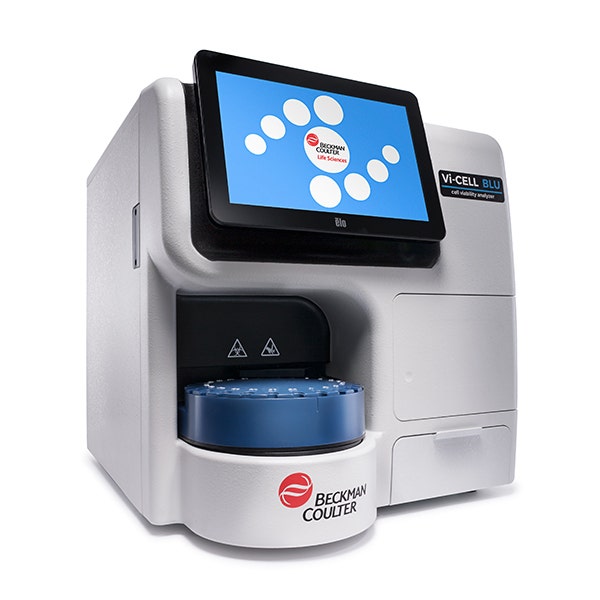The immune system comprises multiple cell types to recognize and kill tumor cells; however, tumor cells can counteract by suppressing the immune response or disguising themselves as normal cells to evade attacks. Cancer immunotherapy harnesses and leverages the patient's defense mechanism to develop effective strategies to combat tumor cells. Among immunotherapy methods, the chimeric antigen receptor (CAR) T cell therapy stands out for its potential to improve the antitumor effects of T cells.¹
T cells play a crucial role in the adaptive immune response. They can recognize tumor cells and exert cytotoxicity based on the tumor-associated antigens presented by dendritic cells (DCs) and macrophages.² On the other hand, tumors can mask their antigens to prevent T cell recognition. To overcome this drawback, T cells collected from the patient can be genetically modified to express chimeric antigen receptors (CARs) able to detect inconspicuous tumor cells.¹
Successful CAR T Cell therapy depends on expanding CAR T cells in the laboratory to produce a large number of copies that can ensure a sustained and effective response in the patient's body.
CAR T Cell Isolation and Activation: Laying the Foundation
T cell expansion begins with the isolation and activation of T cells. A technique called leukapheresis is used to separate peripheral mononuclear blood cells (PBMCs), such as leukocytes and lymphocytes, from the patient's blood sample. T cells are sequestered from the other white blood cell types using cell processors or centrifugation. T cell subsets (e.g., CD4 and CD8) can be isolated using magnetic-activated cell sorting (MACS). Simultaneously, enrichment and depletion techniques remove the remaining red blood cells and platelets.
Isolated T cells are activated by co-incubation with engineered antigen-presenting cells (APCs) that can produce the necessary activation signals. Additionally, magnetic beads coated with antigens, such as CD3 and CD28, combined with the immune-activating cytokine IL-2, can be used to promote T cell activation and promotion. This procedure renders T cells suitable for CAR transduction. Nevertheless, the duration of T cell priming must be monitored to prevent prolonged activation, which may lead to T cell exhaustion.
The final step before expansion involves transduction, which integrates the CAR gene into the T cell genome. Viral vectors, such as lentiviruses or retroviruses, are often used to deliver the CAR transgene. These vectors are designed to be replication-deficient, making them efficient and safe for clinical use. During transduction, viral gene delivery must be performed incrementally, and the culture media must be routinely monitored to optimize transduction efficiency.
T Cell Expansion for CAR T Cell Therapy
The next step is to expand T cells to produce a large population of functional CAR T cells capable of detecting tumor cells.
Understanding Cell Proliferation in CAR T Cells
Large-scale proliferation is achieved by culturing T cells in a medium containing cytokines, such as IL-2, IL-7 and IL-15 and costimulatory signals to promote cell survival and division.³,⁴
The three most important factors for T cell expansion are the seeding density, interleukin concentration and bead-to-cell (B:C) ratio. T cell proliferation also depends on the conditions of the growth medium, such as oxygen and nutrient concentrations.⁵
Factors Influencing Cell Proliferation in Culture
Cell density is one of the most crucial factors in successful T cell expansion, as manufacturers must determine the ideal cell density to ensure optimum growth. While a low cell density may lead to apoptosis due to oxidative stress and insufficient survival signals, extremely high cell densities may cause T cells to compete for resources.⁵ Research by Ghaffari et al. reveals an initial increase in cumulative population doubling as the cell density increases, with the maximum value estimated at 250 x 103 cells/mL. Further increases in cell density during the culture step led to a rapid decline in T cell expansion. The research also revealed the importance of increasing the bead:cell ratio to improve expansion rates.⁵
Cytokines, such as IL-2, IL-7 and IL-15, must be added to the culture to promote survival and proliferation. These cytokines also regulate the differentiation of T cells into cytotoxic and regulatory subtypes.³,⁴
Another factor influencing T cell expansion is the presence of serum in the medium. Although fetal bovine serum and human serum can provide the essential growth factors, vitamins, proteins, ions and hormones for cell growth, their composition depends on the donor, potentially leading to batch-to-batch inconsistencies.⁶ Therefore, manufacturers shifted towards serum-free medium containing synthetic and purified ingredients.
Other factors include gas-permeable culture systems to facilitate oxygen and CO2 exchange and metabolic support, such as adequate glucose supply, to ensure that the T cells remain active during rapid proliferation.⁷
Using Expansion Kits for Enhanced CAR T Cell Growth
The manual preparation of the culture media and its components for CAR T cell production can be cumbersome. Life sciences and biotechnology companies assist manufacturers by developing commercial expansion kits that streamline T cell expansion protocols and workflows. These kits comprise standardized activation reagents, such as antibody-coated magnetic beads, cytokines and nutrients to support growth and regulate differentiation. Expansion kits contain serum-free and GMP-compliant formulations to generate consistent and reproducible workflows. Thus, they help manufacturers develop CAR T cells that are compliant with regulatory requirements and suitable for clinical use.
Quality Control During CAR T Cell Manufacturing
Thorough quality control is essential for ensuring the safety and functionality of CAR T cells. The following tests are implemented to assess T cell expansion:
- Cell viability: Viable cell counts help estimate proliferation rate and detect premature apoptosis.
- Cell size and volume: Size and volume are critical indicators of the activation state of T cells. Changes in size and volume are monitored via label-free methods during isolation, activation, transduction and expansion stages.
- Aggregate detection: This test is implemented during packaging and before administration to ensure safety and functionality.
- Gene expression: Flow cytometry can be used to determine the gene expression levels of the CAR vector. Furthermore, it can help measure surface markers to confirm and quantify T cell subsets.
- Immunophenotyping: Flow cytometry and standardized dry antibody panels can be used to characterize and quantify T cell populations. This method is useful for assessing purity after isolation.
Featured Product
Understanding CAR T Cell Activation and Expansion


Vi-CELL BLU Cell Viability Analyzer
- Fully automated trypan blue dye exclusion method
- High throughput
- 24 position carousel
- Supports 96 well plate
- Faster analysis time compared to Vi-CELL XR
- Single sign-on with Active Directory
- Facilitates 21 CFR Part 11
Challenges in CAR T Cell Expansion and Therapeutic Delivery
Despite the clinical success of CAR T cell therapy, manufacturing and clinical delivery of CAR T cells face several challenges.
T cell quality can vary significantly depending on the patient's age, prior treatment and disease burden, impacting CAR expression, expansion efficiency and therapeutic performance.¹
Bottlenecks during manufacturing include contamination, suboptimal cell expansion and workflow durations. Stringent quality control must be applied to ensure that the T cells are separated from the other elements of the blood sample and free of contaminants. Furthermore, the culture media parameters must be closely monitored to ensure optimal T cell growth and proliferation.¹
Finally, successful clinical delivery for cell therapy can be hampered by toxicities caused by cytokine release syndrome (CRS) and immune effector cell-associated neurotoxicity syndrome (ICANS). These syndromes are characterized by persistent CAR T cell activity and cytokine production, with life-threatening side effects.⁸ Therefore, clinicians must closely regulate the patients upon CAR T administration.
See how Danaher Life Sciences can help
FAQs
What is T cell expansion in the context of CAR T cell therapy?
T cell expansion refers to the laboratory process of multiplying a patient's T cells after they have been genetically modified to express chimeric antigen receptors (CARs), which enable them to target and kill cancer cells effectively.
What are the main steps in the CAR T cell manufacturing process, including T cell expansion?
The process includes T cell collection (usually by leukapheresis), activation, genetic modification (transduction), expansion in culture, quality control testing and reinfusion into the patient.
How long does the T cell expansion process take during CAR T cell therapy manufacturing?
Expansion typically takes 7–14 days, depending on the protocol and the patient's initial T cell quality. Furthermore, long-term research applications require T cell expansion for several weeks.
References
- Sterner RC, Sterner RM. CAR-T cell therapy: current limitations and potential strategies. Blood Cancer J 2021;11(4):69.
- Sun L, Su Y, Jiao A, Wang X, Zhang B. T cells in health and disease. Signal Transduct Target Ther 2023;8(1):235.
- Zhou Y, Husman T, Cen X, Tsao T, Brown J, Bajpai A, et al. Interleukin 15 in cell-based cancer immunotherapy. Int J Mol Sci 2022;23(13):7311.
- Kim J-H, Lee K-J, Lee S-W. Cancer immunotherapy with T-cell targeting cytokines: IL-2 and IL-7. BMB reports 2021;54(1):21.
- Ghaffari S, Torabi-Rahvar M, Aghayan S, Jabbarpour Z, Moradzadeh K, Omidkhoda A, et al. Optimizing interleukin-2 concentration, seeding density and bead-to-cell ratio of T-cell expansion for adoptive immunotherapy. BMC Immunol 2021;22(1):43.
- Eberhardt F, Hückelhoven-Krauss A, Kunz A, Jiang G, Sauer T, Reichman A, et al. Impact of serum-free media on the expansion and functionality of CD19. CAR T-cells. Int J Mol Med 2023;52(1):58.
- MacPherson S, Keyes S, Kilgour MK, Smazynski J, Chan V, Sudderth J, et al. Clinically relevant T cell expansion media activate distinct metabolic programs uncoupled from cellular function. Mol Ther Methods Clin Dev 2022;24:380-393.
- Xiao X, Huang S, Chen S, Wang Y, Sun Q, Xu X, et al. Mechanisms of cytokine release syndrome and neurotoxicity of CAR T-cell therapy and associated prevention and management strategies. J Exp Clin Cancer Res 2021;40:1-23.